|
|
|
Sort Order |
|
|
|
Items / Page
|
|
|
|
|
|
|
| Srl | Item |
| 1 |
ID:
123353
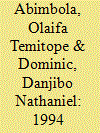

|
|
|
| 2 |
ID:
177863
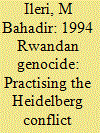

|
|
|
|
|
| Summary/Abstract |
Having suffered one of the worst genocides in recorded history, Rwanda today is a country still striving to maintain the equilibrium between the perpetrators and the survivors. After decades of tension between the Hutu majority and the Tutsi minority, during April to July 1994 an estimated 500,000 to 800,000 people were slaughtered in mass atrocities, with many more displaced from their homes. Political instability, discrimination, traces of colonialism, poverty and competition for power were some of the causes of this horrific extermination. Rwanda has been working ever since to recover from the aftermath of the events that culminated in this government-sponsored slaughter, and has achieved remarkable success – especially in terms of its economy. This study aims to explore the nature of the 1994 genocide against the Tutsi in Rwanda. Fundamentally, it seeks to quantify the intensity and unprecedented nature of the genocide. Understanding how genocides such as this one occurred is crucial for preventing similar future atrocities.
|
|
|
|
|
|
|
|
|
|
|
|
|
|
|
|
| 3 |
ID:
131832
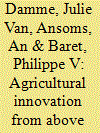

|
|
|
|
|
| Publication |
2014.
|
| Summary/Abstract |
In its 2008 World Development Report, the World Bank pleaded for a 'Green Revolution' for sub-Saharan Africa, pointing particularly to the importance of including smallholder farmers. This article focuses on the banana cropping system in Rwanda, and on the agricultural innovations introduced within this system. We first consider macro-level innovations that are designed to promote a modernized agricultural sector and that correspond to the rationale of the Green Revolution. We analyse how such 'top-down' innovations are received on the ground and show how smallholders seek to evade new government policies when they fail to reflect local economic and social realities. This demonstrates how some rural Rwandans are challenging the authority of the government in disguised ways in order to protect their local livelihoods. The Rwandan experience should inspire continent-wide Green Revolution policies to take account of the risk-coping rationale of small-scale farmers and their capacity to innovate 'from below'.
|
|
|
|
|
|
|
|
|
|
|
|
|
|
|
|
| 4 |
ID:
108123
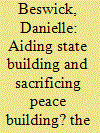

|
|
|
|
|
| Publication |
2011.
|
| Summary/Abstract |
This article explores the relationship between the UK and Rwanda, using the lens of the UK Department for International Development's integrated approach to state building and peace building in fragile and conflict-affected states. It identifies a number of priorities for UK aid under such a framework, but shows that in the case of Rwanda these have not been foregrounded in the bilateral aid relationship. The article suggests a number of reasons for this, arguing that, by refusing to acknowledge or address Rwanda's deviations from what was considered a positive development trajectory, the UK is becoming internationally isolated in its support for the rpf regime. It concludes that, while this bilateral relationship may support achievement of stability and relative security in Rwanda, promoting such a narrow form of state building is detrimental to more holistic peace building, both nationally and regionally.
|
|
|
|
|
|
|
|
|
|
|
|
|
|
|
|
| 5 |
ID:
190841
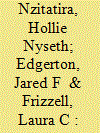

|
|
|
|
|
| Summary/Abstract |
Recent studies of genocide have yielded varying estimates of the number and characteristics of people who engaged in violence. We address these disparities in estimates for one well-studied case: the 1994 genocide in Rwanda. Using novel data from Rwanda’s post-genocide gacaca courts, we provide updated estimates regarding participants. Specifically, we find that between 847,233 and 888,307 people participated in the genocide, with 181,280 to 190,113 people found guilty of only violent offenses, 618,164 to 654,152 individuals found guilty of only property crimes, and 44,042 to 47,789 individuals found guilty of both property and violent crimes. In total, we estimate that between 229,069 and 234,155 individuals were found guilty of a violent offense, including those who committed violent offenses as well as both violent and property offenses. These results align with past research, representing an important convergence of evidence regarding participation in this genocide. We also calculate specific characteristics of participants, finding that nearly 90% of all participants were men and that the median age for all participants was 34. Although most participants committed a single crime, between 215,124 and 222,522 people were found guilty of multiple crimes. Approximately 6% of people accounted for 25% of the property crimes, while 11% of people accounted for 25% of the violent crimes. These findings provide foundational information about one of the deadliest episodes of mass violence in the 20th century.
|
|
|
|
|
|
|
|
|
|
|
|
|
|
|
|
| 6 |
ID:
133716
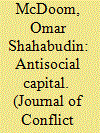

|
|
|
|
|
| Publication |
2014.
|
| Summary/Abstract |
Although popularly perceived as a positive force important for objectives such as economic development and democracy, social capital may also be linked to less desirable outcomes. This article highlights a dark side to social capital by pointing to its role in a particularly pernicious phenomenon: genocidal violence. Drawing on a survey of residents from one community that experienced violence during Rwanda's 1994 genocide, I show that individual participation in the violence was partly determined by the features of residents' social networks. Perpetrators possessed larger networks in general and more connections to other perpetrators in particular. The quality as well as quantity of connections also mattered. Strong ties generally, and kinship and neighborly ties specifically, were strong predictors of participation. In contrast, possession of countervailing ties to nonparticipants did not reduce a resident's likelihood of participation. Drawing on in-depth interviews to explore the possible mechanisms behind these findings, I suggest participants' networks fulfilled functions of information diffusion, social influence, and behavioral regulation. More broadly, the findings suggest the importance of social structure and social interaction for participation in collective violence. Relational data should complement individual attribute data in predicting participation. The findings also suggest, contrary to the neo-Malthusian interpretation, that the role played by Rwanda's extraordinarily high population density in the violence may have been more sociological than ecological in origin. The diffusion, influence, and regulatory effects of social connections are likely to be amplified in communities where individuals live in close spatial proximity to each other.
|
|
|
|
|
|
|
|
|
|
|
|
|
|
|
|
| 7 |
ID:
138341
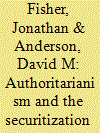

|
|
|
|
|
| Summary/Abstract |
Debate on the ‘securitization’ of aid and international development since 9/11 has been anchored in two key claims: that the phenomenon has been driven and imposed by western governments and that this is wholly unwelcome and deleterious for those in Africa and elsewhere in the developing world. This article challenges both of these assumptions by demonstrating how a range of African regimes have not only benefited from this dispensation but have also actively encouraged and shaped it, even incorporating it into their own militarized state-building projects. Drawing on the cases of Chad, Ethiopia, Uganda and Rwanda—four semi-authoritarian polities which have been sustained by the securitization trend—we argue that these developments have not been an accidental by-product of the global ‘war on terror’. Instead, we contend, they have been the result of a deliberate set of choices and policy decisions by these African governments as part of a broader ‘illiberal state-building’ agenda. In delineating this argument we outline four major strategies employed by these regimes in this regard: ‘playing the proxy’; simultaneous ‘socialization’ of development policy and ‘privatization’ of security affairs; making donors complicit in de facto regional security arrangements; and constructing regime ‘enemies’ as broader, international threats.
|
|
|
|
|
|
|
|
|
|
|
|
|
|
|
|
| 8 |
ID:
145901
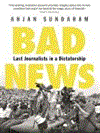

|
|
|
|
|
| Publication |
New Delhi, Bloomsbury Publishing India Pvt. Ltd., 2015.
|
| Description |
192p.hbk
|
| Standard Number |
9789385436956
|
|
|
|
|
|
|
|
|
|
|
|
Copies: C:1/I:0,R:0,Q:0
Circulation
| Accession# | Call# | Current Location | Status | Policy | Location |
| 058710 | 967.5/SUN 058710 | Main | On Shelf | General | |
|
|
|
|
| 9 |
ID:
142551
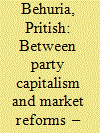

|
|
|
|
|
| Summary/Abstract |
Different strategies have been used by the Rwandan government to promote capitalist accumulation. In some sectors, party and military owned enterprises are predominant. In others, the government has chosen to embrace market-led reforms. Ultimately, the vulnerability experienced by ruling elites contributes to the choice of how capital accumulation is promoted in different sectors. Ruling elites use party and military enterprises to centralise rents and establish control over the direction of economic policy. However, centralising rents is a political choice and excludes individuals from developing access to rents. The pyrethrum sector shows that the use of such groups has resulted in unequal outcomes despite increases in productivity. Reduced international prices have stunted further productivity. Conversely, the mining sector shows evidence of the pursuit of market-led reforms. These reforms have been accompanied by rapid growth in domestic production and exports. Foreign investment was necessary in order to bring capital and expertise to the sector. However, the government has struggled to retain the capacity to enforce legislation and discipline foreign investors in line with national priorities. Both sectors show evidence that ruling elites have been prompted by vulnerability to commit to economic development. Constraints that have accompanied strategies pursued in these sectors have forced the government to work ‘reactively’ to achieve strategic targets.
|
|
|
|
|
|
|
|
|
|
|
|
|
|
|
|
| 10 |
ID:
072895
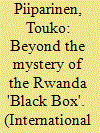

|
|
|
|
|
| Publication |
2006.
|
| Summary/Abstract |
According to the conventional wisdom of the current debate on peacekeeping, the failures of the UN Security Council in general and in Rwanda in particular can be attributed to an absence, not of early warning systems, but of political will on the part of member states. This article argues against the assertion, advanced in much of the existing literature, that political will outweighed early warning in importance. These two factors were interlinked and cannot therefore be compared as if they existed separately. Instead, a more advanced early warning mechanism would have changed the political context so as to facilitate political will to intervene. At a minimal level, such a positive causal relationship would have enabled non-permanent Council members to acknowledge the genocide prior to UNAMIR's (United Nations Assistance Mission for Rwanda) withdrawal and thus to create a political atmosphere of urgency to rescue Rwandans instead of withdrawing troops.
|
|
|
|
|
|
|
|
|
|
|
|
|
|
|
|
| 11 |
ID:
114721
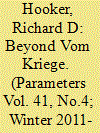

|
|
|
| 12 |
ID:
102006
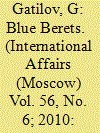

|
|
|
|
|
| Publication |
2010.
|
| Summary/Abstract |
THE UN'S BLUE BERETS have become a permanent feature of world politics in the past few decades. No matter where interstate or internal conflicts flare up in the world, the UN duly sends international military contingents and observers, as well as police officers and civilian personnel, to these hot spots to halt the hostilities and restore stability. This activity has essentially been the visible embodiment of the UN's global role, its business card, for more than 60 years now.
|
|
|
|
|
|
|
|
|
|
|
|
|
|
|
|
| 13 |
ID:
082331
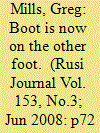

|
|
|
| 14 |
ID:
051889
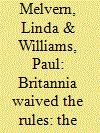

|
|
|
|
|
| Publication |
Jan 2004.
|
| Summary/Abstract |
Ten years after the 1994 Rwandan genocide occurred, serious questions remain about the circumstances of the British government's response. This article critically evaluates the response of John Major's government to the genocide. It does so in four stages. The first section provides a brief overview of the Major government's international agenda in 1994, focusing on British policy towards the war in Bosnia and the African continent in general. The second section deals with the substance of Britain's Rwanda policy, while the third discusses the ways in which this policy has been almost totally omitted from mainstream accounts of this period. The final section provides a critical evaluation of some of the tactics that British officials employed to avert criticism of their government's policies. Based on the evidence presented we conclude that the British government displayed a deeply troubling indifference towards the victims of Rwanda's genocide.
|
|
|
|
|
|
|
|
|
|
|
|
|
|
|
|
| 15 |
ID:
085159
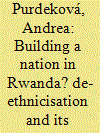

|
|
|
|
|
| Publication |
2008.
|
| Summary/Abstract |
Rwanda remains in the eastern camp of ethnic ideas and projects of a 'nation' inasmuch as it is dominated by cultural as opposed to civic/political elements. Although the Rwandan attempt remains exclusive internally, it does not affirm the validity of an idealised Kohnian dichotomy between 'exclusive' ethnic nationalism and 'inclusive' civic nationalism. To avoid the trap of a bi-polar and value-ladden division, while preserving the useful insights of Kohn, the paper calls for a re-conceptualisation of nation-building projects along the continuum of their relative inclusiveness/exclusiveness, both internally (who shapes the 'idea of nation') and externally (the boundaries of nation).
|
|
|
|
|
|
|
|
|
|
|
|
|
|
|
|
| 16 |
ID:
104592
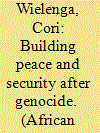

|
|
|
| 17 |
ID:
121587


|
|
|
|
|
| Publication |
2012.
|
| Summary/Abstract |
The substantial literature on mass violence, from ethnic cleansing to civil wars, has paid surprisingly little attention to the largest instance of mass violence in human history: the Holocaust. When political scientists have approached the subject, the trend has been to treat the Holocaust as a single case, comparing it-sometimes controversially-with other instances of genocide such as Rwanda or Cambodia. But historically grounded work on the destruction of European Jewry can help illuminate the microfoundations of violent politics, unpack the relationship between a ubiquitous violence-inducing ideology (antisemitism) and highly variable murder, and recast old questions about the origins and evolution of the Holocaust itself. After reviewing new trends in history-writing, I highlight opportunities for social-scientifically oriented research centered on the interaction of state power, local communities, and violent mobilization in five areas: military occupation, repertoires of violence, alliance politics, genocidal policymaking, and resistance. My conclusion addresses thorny issues of comparison, morality, and memory.
|
|
|
|
|
|
|
|
|
|
|
|
|
|
|
|
| 18 |
ID:
157714
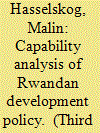

|
|
|
|
|
| Summary/Abstract |
This article provides a capability analysis of Rwandan development policy. It is motivated by impressive progress on human development indicators in combination with highly centralised policymaking, giving ambiguous signs regarding a capability approach. It is based on extensive original empirical material, along with large numbers of official documents and academic sources. The analysis is structured around three issues that concern the relation between individual agency and government policy, and that are debated among capability scholars as well as in relation to Rwandan development policy: participation, transformation and paternalism. The finding that Rwandan development policy reflects an approach very different from a capability approach is not surprising, but establishes that the assumed link between human development indicators and the capability approach needs to be questioned. This brings our attention to shortcomings in any quantitative measurements of development, or in the use of and importance attached to them, as well as to the problem of assuming that certain outputs go hand in hand with certain processes. While this is valid for contexts far beyond Rwanda, it also sheds light specifically on the polarisation that exists in the scholarly debate on Rwanda
|
|
|
|
|
|
|
|
|
|
|
|
|
|
|
|
| 19 |
ID:
162766
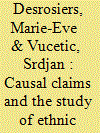

|
|
|
|
|
| Summary/Abstract |
What does causation mean in conflict studies? Using a sample of published qualitative, article-length studies on the Rwandan and Yugoslav wars, this article finds a lack of reflexivity over causal claims in scholarship on conflict. Causal language is not as pervasive as expected, asserted cause-effect relationships are rarely fully explicated, and scholars under-explore their causal assumptions. Considering that ideas on causation necessarily condition explanations of conflict, including “ethnic” conflict, this is a major research issue. While there exists a lively debate between different causal narratives regarding the onset of conflict—with studies alternatively stressing “attitudes,” “conditions,” or both—it stops short of addressing issues at the deeper level of causal understandings. For the most part, studies subscribe to the search for empirical generalization, thus limiting attendant debates to a single model of causation. These findings indicate that conflict studies literature would benefit from greater reflexivity and pluralism with regards to causation and paying more attention to philosophical debates on the subject. The article provides a basic outline of this reflexive agenda.
|
|
|
|
|
|
|
|
|
|
|
|
|
|
|
|
| 20 |
ID:
100958
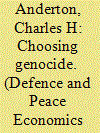

|
|
|
|
|
| Publication |
2010.
|
| Summary/Abstract |
An economic theory of genocide is presented with application to Rwanda-1994. The theory considers 'macro' conditions under which an authority group chooses genocide and 'micro' conditions that facilitate the spread of genocide. From the macro perspective, a bargaining model highlights four rational explanations for an authority's choice of genocide: prevention of loss of power, indivisibility, elimination of a persistent rival, and political bias. From the micro perspective, an evolutionary game model shows how supporters of genocide gain the upper hand in group dynamics over resisters and bystanders. The theory and application suggest that the conditions for genocide are not exceptional.
|
|
|
|
|
|
|
|
|
|
|
|
|
|
|
|
|
|
|
|
|